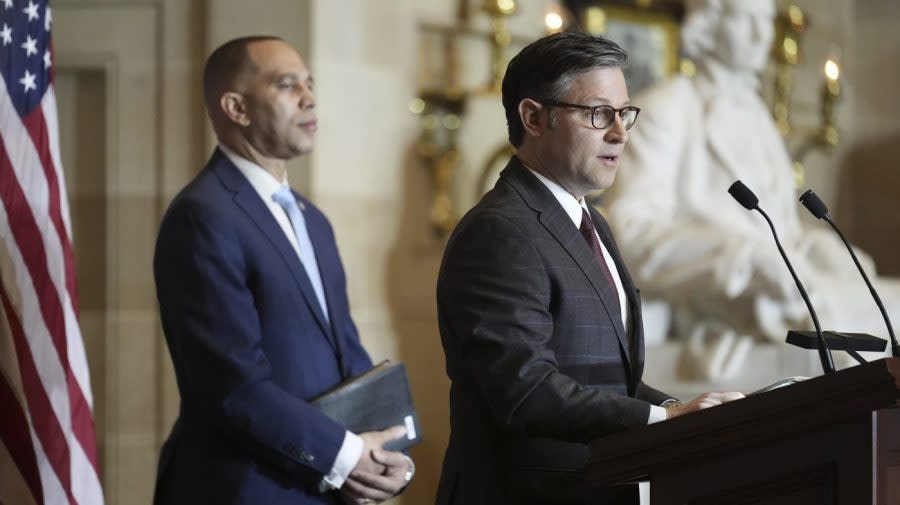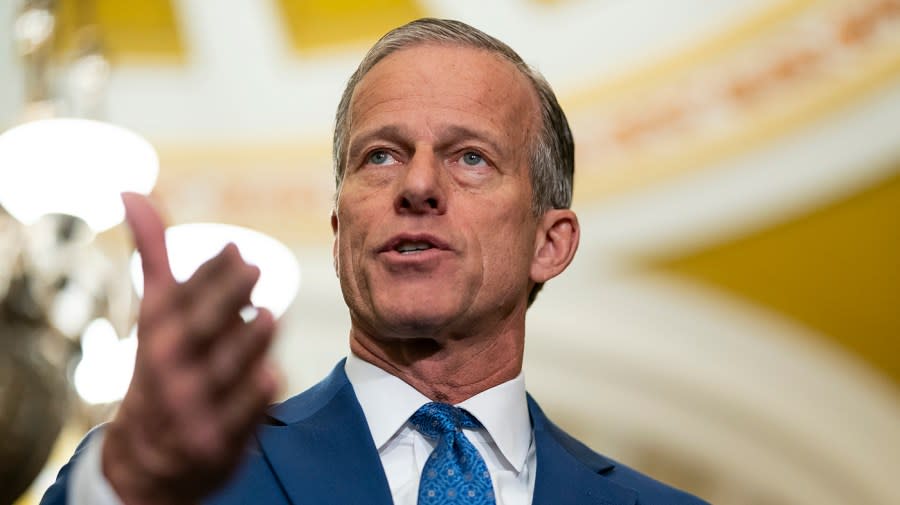GOP shutdown fears grow: ‘We could be in a world of hurt’
Leaders in both parties are racing to secure a deal on government spending as the negotiation window quickly closes and the fears of a shutdown grow more pronounced.
Congress returns to Washington next week facing a pair of looming funding deadlines — March 1 for a handful of agencies and March 8 for the rest — leaving lawmakers with little time to iron out their differences and get bills to the floor to keep the government open.
While Speaker Mike Johnson (R-La.) has moved deftly to avoid a shutdown since taking the gavel in October, restive conservatives are losing patience with his willingness to cut budget deals across the aisle. And some observers on Capitol Hill are already warning that the current fight is the greatest shutdown threat of this Congress.
“I’m worried. Of all the scares we’ve had since the last fiscal year, I think this is going to be the scariest. I think we could be in a world of hurt,” said a Senate GOP aide. “I don’t know if it’ll be a partial or a full, but I think the chances of a shutdown are the highest we’ve had this fiscal year.”
Party leaders in both chambers have sought to assure the public — and the markets — that the sides will come together to adopt their appropriations bills and avoid any disruptions to government operations.

House Speaker Mike Johnson of La., speaks during the National Prayer Breakfast, Thursday, Feb. 1, 2024, at the Capitol in Washington, as House Minority Leader Hakeem Jeffries, D-N.Y., looks on. (AP Photo/Andrew Harnik)
But a number of disagreements remain between the parties. And Johnson is facing additional pressures from within his own Republican conference, where conservatives are demanding right-wing policy riders that are a non-starter with Democrats in both Congress and the White House.
The mix of factors — political, tactical and temporal — is sparking plenty of concerns that Congress will be unable to reach the agreement to prevent the partial shutdown that’s looming at the end of next week.
“I think the odds are 50-50 at this point,” Rep. Patrick McHenry (R-N.C.) told CBS’s Major Garrett on “The Takeout” podcast this week.
McHenry, chair of the Financial Services Committee, called the current shutdown threat “a preventable disaster” — one that might have been avoided if party leaders had moved the spending bills late last year instead of kicking the process into an election year.
He’s urging Johnson to resist the ultimatums from his conservative wing and move forward with whatever agreements emerge from the talks between appropriators, who have been working furiously through the holiday recess to finalize their bills in time for the first deadline next Friday.
A deal is expected to be released as early as Sunday
“All the Speaker has to do is allow the Appropriations Committee to go get a deal,” McHenry said. “If the Speaker wishes to stop it, for whatever reason, we’ll probably have a government shutdown.”
Top Stories from The Hill
Trump calls on Alabama to protect IVF treatment after bombshell ruling
Haley says Trump wouldn’t win general election: ‘Mark my words’
Trump demands judge toss classified documents charges: What to know
The debate is the latest challenge for Johnson who, less than four months into his Speakership, is facing the same dilemma over government funding that led to the removal of his predecessor. And his options all carry risks.
If Johnson brings bipartisan spending compromises to the floor, he could keep the government open but might face the conservative backlash that toppled former Speaker Kevin McCarthy (R-Calif.). If he decides to block those spending bills, the government would likely shut down, providing a political gift to President Biden and the Democrats just months before November’s elections.
“The House is working hard to meet the deadlines,” a Speaker spokesperson told The Hill.
Sen. John Thune (R-S.D.) acknowledged that Johnson is essentially in the driver’s seat, saying the direction of the spending debate will “hinge principally on what the House thinks they can do.”
“We’ll see what the appetite is, but the House probably drives that,” Thune told The Hill on Thursday.
“There’s going to be a ton of pressure to get it done in a short amount of time,” he added.
Hard-liners are already turning up the heat on Johnson.
Twenty-eight members of the House Freedom Caucus penned a letter to the Speaker on Wednesday requesting an update on their conservative policy demands, which touch on a host of explosive topics that include abortion, immigration and eliminating the salaries of certain federal officials.
Without those provisions, the hard-liners said, the House will have a difficult time wrangling GOP support for government funding.
“There are MANY other policies and personnel that Congress should not be funding, and a failure to eliminate them will reduce the probability that the appropriations bills will be supported by even a majority of Republicans,” the lawmakers wrote.

Sen. John Thune (R-S.D.) addresses reporters after the weekly policy luncheon on Tuesday, February 6, 2024. (Greg Nash)
The demand for policy riders has already been squarely rejected by top Democrats, who are warning that any bill with those provisions will never reach Biden’s desk.
“The riders are non-negotiable. They’re off the table,” said Rep. Rosa DeLauro (Conn.), senior Democrat on the Appropriations Committee. “Get those off the table, we can come to conclusions.”
Democrats have their own set of policy demands, including more funding for a federal program — the Special Supplemental Nutrition Program for Women, Infants, and Children, known as WIC — that helps to feed millions of low-income children and their mothers. WIC is facing a shortfall, and DeLauro said Democrats won’t support any spending bill that doesn’t fix it.
“That’s an issue that is not negotiable,” she said.
If conservatives do not secure their policy riders, as expected, the hard-liners are already eyeing a Plan B to fund the government: a one-year continuing resolution that would trigger a 1 percent cut across the board beginning in April, as per the mechanism lawmakers included in the debt limit deal last year to encourage completion of the appropriations process.
Democrats — and even some GOP defense hawks — are adamantly opposed to that cut, while conservatives are embracing it.
“If we are not going to secure significant policy changes or even keep spending below the caps adopted by the bipartisan majorities less than one year ago, why would we proceed when we could instead pass a year-long funding resolution that would save Americans $100 billion in year one?” the Freedom Caucus members wrote to Johnson.
The stakes in the spending debate also extend to the campaign trail, where Republicans are trying to demonstrate to voters that they can govern capably and deserve to remain in the House majority next year. With that in mind, some of the more vulnerable GOP lawmakers are already pressing Johnson to move quickly next week to prevent a shutdown.
“When we get back, we need to move expeditiously to pass the appropriations bills. The time for haggling over it is over,” Rep. Mike Lawler (R-N.Y.) said. “I will leave it to leadership on how they plan to proceed. But at the end of the day, we need to fund the government. We’re not dealing with a government shutdown.”
Lawler, who represents a district Biden won by 10 points in 2020, also had some choice words for the conservatives who say they’d prefer a shutdown to new funding bills that will increase deficit spending.
“For my colleagues that have a problem with it,” he said, “they should have thought long and hard about that before they removed Kevin McCarthy as Speaker.”
Another potential landmine in the debate is the question of sending additional aid to Ukraine, which has bedeviled lawmakers — especially Johnson — for months.
Johnson had opposed the Senate negotiated foreign-aid-plus-border-security bill, arguing that the border provisions did not go far enough. But conservatives are still balking at sending aid overseas without border security, demanding policies similar to those in H.R. 2, the sweeping border package they passed last year.
McHenry said there’s “a pretty high chance” lawmakers will seek to attach the stalled foreign aid onto spending bills, especially if the government does shut down and Congress finds itself looking for a way out.
“It could be post-government shutdown if that happens. The point of leverage becomes mighty then,” McHenry told CBS. “It could be in the week leading up, to the week leading after … There are a couple different legislative avenues that can be taken.”
Combining spending with foreign aid, however, would only expose Johnson to more attacks from conservatives, many of whom are opposed to any overseas assistance without first addressing the border. Some said they trust Johnson not to bring such a bill to the floor.
“Our members are not interested in funding the Ukraine effort going forward if the southern border is unsecured, and the Speaker has been crystal clear on that,” Rep. Byron Donalds (R-Fla.) said. “The White House and the Senate just simply don’t care.”
As lawmakers barrel toward their fourth shutdown showdown this Congress — which has been billed the most unproductive in years — some members are openly airing their frustration with being unable to complete the “key” part of their job.
“Appropriations bills being the key issue of just basic job performance … It’s like showing up to work on time and passing your drug test. It’s like that basic level. It’s not saying you’re competent or good or anything else,” McHenry told CBS. “But we’ve done a terrible job with that.”
For the latest news, weather, sports, and streaming video, head to The Hill.


